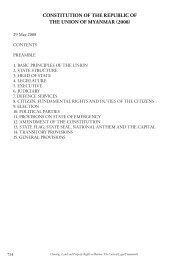Myanmar at the HLP Crossroads: - Displacement Solutions
Myanmar at the HLP Crossroads: - Displacement Solutions
Myanmar at the HLP Crossroads: - Displacement Solutions
You also want an ePaper? Increase the reach of your titles
YUMPU automatically turns print PDFs into web optimized ePapers that Google loves.
Executive SummaryFew issues are as frequently discussed and politically charged in transitional <strong>Myanmar</strong> as <strong>the</strong>st<strong>at</strong>e of housing, land and property (<strong>HLP</strong>) rights. The effectiveness of <strong>the</strong> laws and policiesth<strong>at</strong> address <strong>the</strong> fundamental and universal human need for a place to live, to raise a family,and to earn a living, is one of <strong>the</strong> primary criterion by which most people determine <strong>the</strong> qualityof <strong>the</strong>ir lives and judge <strong>the</strong> effectiveness and legitimacy of <strong>the</strong>ir Governments. Housing, landand property issues undergird economic rel<strong>at</strong>ions, and have critical implic<strong>at</strong>ions for <strong>the</strong> abilityto vote and o<strong>the</strong>rwise exercise political power, for food security and for <strong>the</strong> ability to accesseduc<strong>at</strong>ion and health care.As <strong>the</strong> n<strong>at</strong>ion struggles to build gre<strong>at</strong>er democracy and seeks growing engagement with<strong>the</strong> outside world, <strong>Myanmar</strong> finds itself <strong>at</strong> an extraordinary juncture; in fact, it finds itself <strong>at</strong><strong>the</strong> <strong>HLP</strong> <strong>Crossroads</strong>. The decisions <strong>the</strong> Government makes about <strong>HLP</strong> m<strong>at</strong>ters during <strong>the</strong>remainder of 2012 and beyond, in particular <strong>the</strong> highly controversial issue of potentially transformingSt<strong>at</strong>e land into priv<strong>at</strong>ely held assets, will set in place a policy direction th<strong>at</strong> will have amarked impact on <strong>the</strong> future development of <strong>the</strong> country and <strong>the</strong> day-to-day circumstances inwhich people live. Getting it right will fundamentally and positively transform <strong>the</strong> n<strong>at</strong>ion from<strong>the</strong> bottom-up and help to cre<strong>at</strong>e a n<strong>at</strong>ion th<strong>at</strong> consciously protects <strong>the</strong> rights of all and shows<strong>the</strong> true potential of wh<strong>at</strong> was until very recently one of <strong>the</strong> world’s most isol<strong>at</strong>ed n<strong>at</strong>ions.Getting it wrong, conversely, will delay progress, and more likely than not drag <strong>the</strong> n<strong>at</strong>ion’seconomy and levels of human rights protections downwards for decades to come.<strong>Myanmar</strong> faces an unprecedented scale of structural landlessness in rural areas, increasingdisplacement thre<strong>at</strong>s to farmers as a result of growing investment interest by both n<strong>at</strong>ionaland intern<strong>at</strong>ional firms, expanding specul<strong>at</strong>ion in land and real est<strong>at</strong>e, and grossly inadequ<strong>at</strong>ehousing conditions facing significant sections of both <strong>the</strong> urban and rural popul<strong>at</strong>ion.Legal and o<strong>the</strong>r protections afforded by <strong>the</strong> current legal framework, <strong>the</strong> new FarmlandLaw and o<strong>the</strong>r newly enacted legisl<strong>at</strong>ion are wholly inadequ<strong>at</strong>e. These conditions are fur<strong>the</strong>rcompounded by a range of additional <strong>HLP</strong> challenges linked both to <strong>the</strong> various peace negoti<strong>at</strong>ionsand armed insurgencies in <strong>the</strong> east of <strong>the</strong> country, in particular Kachin St<strong>at</strong>e, and <strong>the</strong>unrest in Rakhine St<strong>at</strong>e in <strong>the</strong> western region. The Government and people of <strong>Myanmar</strong> arethus struggling with a series of <strong>HLP</strong> challenges th<strong>at</strong> require immedi<strong>at</strong>e, high-level and cre<strong>at</strong>ive<strong>at</strong>tention in a rights-based and consistent manner.As <strong>the</strong> country begins wh<strong>at</strong> will be a long and arduous journey toward democr<strong>at</strong>iz<strong>at</strong>ion, <strong>the</strong> rule oflaw and stable new institutions, laws and procedures, <strong>the</strong> time is ripe for <strong>the</strong> Government to worktoge<strong>the</strong>r with all stakeholders active within <strong>the</strong> <strong>HLP</strong> sector to develop a unique <strong>Myanmar</strong>centricapproach to addressing <strong>HLP</strong> challenges th<strong>at</strong> shows <strong>the</strong> country’s true potential. Andit is also time for <strong>the</strong> Government to begin to take comprehensive measures – some quickand short-term, o<strong>the</strong>rs more gradual and long-term – to equitably and intelligently address <strong>the</strong>considerable <strong>HLP</strong> challenges <strong>the</strong> country faces, and grounding <strong>the</strong>se firmlywithin <strong>the</strong> reform process.“Rule of law is a must for our administr<strong>at</strong>ive mechanisms,businesses, social welfare, political processes, intern<strong>at</strong>ionalrel<strong>at</strong>ions and judicial system. If rule of law prevails in oursociety, human rights, liberty and democracy would flourishautom<strong>at</strong>ically. Consolid<strong>at</strong>ion of every step of n<strong>at</strong>ionalbuilding endeavors depends on <strong>the</strong> rule of law. So, we all areto serve th<strong>at</strong> duty in unison and in concert.”--President Thein Sein, 1 March 2012













